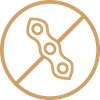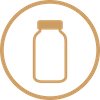Vitamin C is involved in numerous redox reactions as an antioxidant and cofactor, thus influencing numerous processes in the human body, such as energy metabolism and the immune system, and providing antioxidative protection to cells. It is also involved in the formation of collagen, the structural protein found in skin, cartilage, bones and blood vessels, as well as in the synthesis of hormones.
High concentrations of vitamin C are found naturally in fresh fruits, vegetables and berries such as camu camu, sea buckthorn berry, acerola cherry, rosehip, black currant, kale, parsley, kiwis and citrus fruits, among others.
Organic Acerola
The acerola shrub, whose fruits look similar to European cherries (although they are not related), is endemic to Central and South America. Acerola grows mainly along roadsides and rivers, but also on dry, rocky mountain slopes at altitudes up to 1,600m. The acerola we use in this formulation is sourced from Brazil, where it is gently freeze dried immediately after harvest.
Acerola cherries are known for their exceptionally high vitamin C content (approximately 1,700mg/100g fresh). They are also rich in secondary phytochemicals (flavonoids, anthocyanins) and many other bioactives, which together significantly increase the bioavailability and retention of vitamin C. The gentle freeze-drying process results in an extraordinarily highly concentrated powder (30% vitamin C) and does not require the use of any controversial carriers such as maltodextrin.
The role of vitamin C in the body remains an active area of research. Almost every year, new mechanisms of action are discovered for this fascinating vitamin. The following statements regarding vitamin C are provided by the EU:
Health Benefits of Vitamin C
According to the European Food Safety Authority (EFSA), Vitamin C contributes to:
- The reduction of tiredness and fatigue
- Normal mental function
- The regeneration of the reduced form of vitamin E
- Normal energy metabolism
- Normal immune system function
- The normal function of the nervous system
- Protecting cells against oxidative stress
- Normal collagen formation for normal blood vessel function
- Normal collagen formation for normal bone function
- Normal collagen formation for normal cartilage function
- Normal collagen formation for normal dental function
- Normal collagen formation for normal gum function
- Normal collagen formation for normal skin function
- Increasing iron absorption
- Maintaining normal immune system function both during and after intense physical activity































